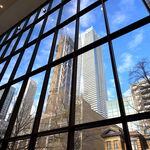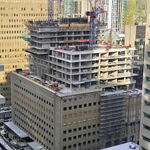Rainforest
Senior Member
I hope Metrolinx is low-balling the speed and travel time estimates for Finch LRT, just to avoid a future disappointment. I have a couple of reasons to think so.
First of all, TTC did speed modeling for Sheppard East LRT about 15 years ago, in the early days of Transit City. At that time, they came up with 27 kph if the average stop spacing is 800 m, or 22-23 kph if the average stop spacing is 400 m.
For Finch West, the average stop spacing is 11 km / 17 stop intervals = 647 m. That's roughly halfway between 400 m and 800 m, thus the speed should be about 25 kph.
Secondly, LRT should be faster than the mixed-traffic bus, because a) LRT has exclusive lanes, and b) Finch LRT has fewer stops than the bus it replaces. The bus average speed in mixed traffic is 17 kph. One should expect the LRT to be somewhat faster.
If one of the latest Metrolinx forecasts is correct ..
11 km in 33 min = 20 kph
11 km in 38 min = 17.4 kph
The former is marginally faster than the bus. The latter isn't faster at all.
I guess we will see in a year or in 18 months when Finch LRT starts running. If it's not faster than bus, then we can forget about any new LRT lines in the inner suburbs, there will be no public appetite for those. LRT has one other advantage: greater capacity, but given the massive cost of LRT construction, the councillors and the riders will opt for just running more buses, and perhaps BRT lanes.
Technically, LRT should be able to run 25-30% faster than the mixed trraffic bus. If the transit operator can't make that happen, time to scrutinize their operational practices.
First of all, TTC did speed modeling for Sheppard East LRT about 15 years ago, in the early days of Transit City. At that time, they came up with 27 kph if the average stop spacing is 800 m, or 22-23 kph if the average stop spacing is 400 m.
For Finch West, the average stop spacing is 11 km / 17 stop intervals = 647 m. That's roughly halfway between 400 m and 800 m, thus the speed should be about 25 kph.
Secondly, LRT should be faster than the mixed-traffic bus, because a) LRT has exclusive lanes, and b) Finch LRT has fewer stops than the bus it replaces. The bus average speed in mixed traffic is 17 kph. One should expect the LRT to be somewhat faster.
If one of the latest Metrolinx forecasts is correct ..
11 km in 33 min = 20 kph
11 km in 38 min = 17.4 kph
The former is marginally faster than the bus. The latter isn't faster at all.
I guess we will see in a year or in 18 months when Finch LRT starts running. If it's not faster than bus, then we can forget about any new LRT lines in the inner suburbs, there will be no public appetite for those. LRT has one other advantage: greater capacity, but given the massive cost of LRT construction, the councillors and the riders will opt for just running more buses, and perhaps BRT lanes.
Technically, LRT should be able to run 25-30% faster than the mixed trraffic bus. If the transit operator can't make that happen, time to scrutinize their operational practices.





